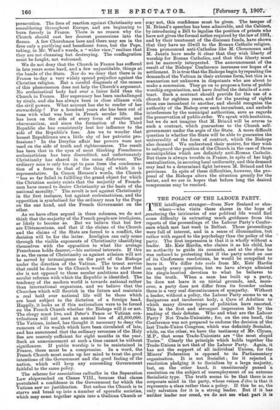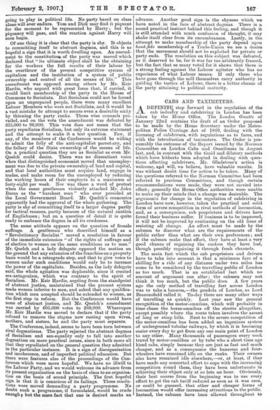THE POLICY OF THE LABOUR PARTY.
91HE intelligent stranger—from New Zealand or else- 1 where—who visits these shores in the hope of ,mastering the intricacies of our political life would find some difficulty in extracting much guidance from the reports of the proceedings of the Labour Party's Confer- ence which met last week in Belfast. Those proceedings were full of interest, and in a sense of illumination, but rather with regard to the psychology than the policy of the party. The first impression is that it is wholly without a leader. Mr. Keir Hardie, who claims it as his child, has no authority to guide its counsels, and at the close he was reduced to protesting that if the party acted on one of its Conference resolutions, he would be compelled to leave it. We differ toto coelo from Mr. Keir Hardie on nearly every question, but we have always admired his single-hearted devotion to what he believes to be the truth. When a man has built up a party, he does not leave it on trivial grounds, and, more- over, a party does not differ from its founder unless there is a very real discontinuance of sympathy. Without a leader, without a policy, the Labour Party seems to us at. fissiparous and incoherent body, a Cave of Adullam to which many diverse types of politician have resorted. • This is the first and strongest impression left by the reading of their debates. Who and what are the Labour Party ? Not Trade-Unionists ; for, on the one hand, the Conference was not prepared to endorse the decision of the last Trade-Union Congress, which was definitely Socialist, while, on the other, we have the testimony of Mr. Clynes, M.P., that some Trade-Unionists are "the most stupid Tories." Clearly the principle which holds together the Trade-Unions is not that of the Labour Party. Again, it has not the support of all individual Unions, for the Miners' Federation is opposed to its Parliamentary organisation. It is not Socialist ; for it rejected a resolution pledging it to Socialism by a large majority, but, on the other hand, it unanimously passed a resolution on the subject of unemployment of an extreme Socialistic type. The truth seems to be that there is no corporate mind in the party, whose raison cr etre is that it represents a class rather than a policy. If this be so, the only salvation for it is a strong leader. But if it has neither leader nor creed, we do not see what part it is
going to play in political life. No party based on class alone will ever endure. Tom and Dick may find it piquant for the moment to be represented by Harry ; but the piquancy will pass, and the reaction against Harry will soon begin.
Of one thing it is clear that the party is shy. It objects to committing itself to abstract dogmas, and this is so hopeful a sign that it is worth dwelling upon. An amend- ment to the constitutio4 of the party was moved which declared that "its ultimate object shall be the obtaining for the workers the full results of their labour by the overthrow of the present competitive system of capitalism and the institution of a system of public ownership and control of all the means of life." This amendment was opposed among others by Mr. Keir Hardie, who argued with great force that, if carried, it would limit membership of the party in the House of Commons to Socialists. But Socialism could not be forced upon an unprepared people, there were many excellent Labour Members who were not Socialists, and it would be a vast mistake to attempt to secure even a desirable unity by thinning the party ranks. These wise counsels pre- vailed, and on the vote the amendment was defeated by 835,000 to 98,000. This vote does not mean' that the party repudiates Socialism, but only its extreme statement and the attempt to make it a test question. Few, if any, of the members of the Conference would be willing to admit the folly of the anti-capitalist parrottcry, and the fallacy of the State ownership of the means of life. On a practical question they are as Socialist as even Mr. Quelch could desire. There was no dissentient voice when that distinguished economist moved that unemploy- ment was due to the private ownership of land and capital, and that local authorities must acquire land, engage in trades, and make room for the unemployed by reducing the working hours of their employes to a maximum of forty-eight per week. Nor was there a word of protest when the same gentleman violently attacked Mr. John Burns as the "harshest man" who ever presided at the Local Government Board. Mr. Quelch's economics apparently had the approval of the whole gathering. The party is shy of committing itself to a larger dogma partly for tactical reasons, partly because of the natural caution of Englishmen; but on a question of detail it is quite ready to embrace the dogma in all its crudeness.
The same attitude appears on the question of female suffrage. A gentleman who described himself as a "Revolutionary Socialist" moved a resolution in favour of the immediate extension "of the rights of suffrage and of election to women on the same conditions as to men." Mr. Quelch and a lady delegate opposed the motion on the ground that any extension of the franchise on a property basis would be a retrograde step, and that to give votes to women under such conditions would only be to increase the power of the capitalists. Besides, as the lady delegate said, the whole agitation was deplorable, since it created sex-antagonism, which was contrary to the spirit of Socialism. Mr. Keir Hardie, argiling from the standpoint of abstract justice, maintained that the present system made women inferior to men, and asked that any qualifica- tion which men accepted should be extended to women, as the Arst step in reform. But the Conference would have none of abstract justice, and Mr. Quelch's amendment was carried by 605,000 votes to 268,000. Whereupon Mr. Keir Hardie was moved to declare that if the party refused to remove the stigma now resting upon wives, mothers, and sisters, he and the party must separate.
The Conference, indeed, seems to have been torn between rival dogmatisms. The party rejected the abstract dogmas of Socialism and sex-equality only to fall into another dogmatism on more practical issues, since in both cases all that they repudiated on the general question they admitted in the particular instance. It is a sign of disorganisation and incoherence, and of imperfect political education. But there were, features also of the proceedings of the Con- ference which were more hopeful. We have no illwill to the Labour Party, and we would welcome its advance from its present organisation on the basis of class to an organisa- tion on the basis of sound principle. The first hopeful sign is that it is conscious of its failings. Three resolu- tions were moved demanding a party programme. No doubt such a programme, if formulated, would be crude enough p but the mere fact that one is desired marks an advance. Another good sign is the shyness which we have noted in the face of abstract dogmas. There is a sound practical instinct behind this feeling, and though it is still attended with much confusion of thought, it may shake itself clear from its encumbrances. Lastly, in the attempt to make membership of the party depend upon bond-fide membership of a Trade-Union we see a desire that the movement should not be exploited for private or party ends. The resolution on this subject was defeated, as it deserved to be, for it was far too arbitrarily framed, but the fact that so many voted for it shows that there is a strong feeling against the Labour agitator who has no experience of what Labour means. If only those who have gone through the mill themselves carry authority in guiding the tactics of Labour, there is a better chance of the party attaining to political maturity.







































 Previous page
Previous page